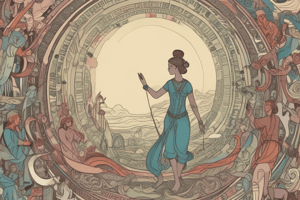Podcast
Questions and Answers
What is a key distinction between charisma and authority in literary leadership?
What is a key distinction between charisma and authority in literary leadership?
- Charisma is typically associated with tyrannical figures, while authority is linked to heroic leaders.
- Charisma is effective in all contexts, while authority is only effective in political scenarios.
- Charisma leads to ethical dilemmas, whereas authority ensures moral clarity.
- Charisma inspires allegiance through personal qualities, while authority relies on formal positions. (correct)
Which archetype is characterized by moral dilemmas and complex leadership decisions?
Which archetype is characterized by moral dilemmas and complex leadership decisions?
- The Heroic Leader
- The Reluctant Leader
- The Tyrant (correct)
- The Ethical Leader
How does context influence leadership effectiveness in literature?
How does context influence leadership effectiveness in literature?
- It determines what archetypes are portrayed in the narrative.
- It shapes the presentation of leaders based on cultural and historical backgrounds. (correct)
- It allows for the creation of fictional leadership qualities irrelevant to reality.
- It has no impact as leadership qualities are universal.
Which character exemplifies the archetype of The Reluctant Leader?
Which character exemplifies the archetype of The Reluctant Leader?
What is a primary function of symbolism in the portrayal of leadership?
What is a primary function of symbolism in the portrayal of leadership?
What literary work serves as an allegorical representation of political leadership and corruption?
What literary work serves as an allegorical representation of political leadership and corruption?
Which modern perspective in literature reflects on leadership?
Which modern perspective in literature reflects on leadership?
What aspect of leadership in literature is often analyzed through feminist or post-colonial lenses?
What aspect of leadership in literature is often analyzed through feminist or post-colonial lenses?
In which literary work is Gatsby's leadership portrayed as flawed in the context of the American Dream?
In which literary work is Gatsby's leadership portrayed as flawed in the context of the American Dream?
Which of the following is NOT a common theme in literary studies of leadership?
Which of the following is NOT a common theme in literary studies of leadership?
Flashcards are hidden until you start studying
Study Notes
Leadership in Literature
-
Definition: Leadership in literature examines the portrayal, attributes, and impact of leaders within narrative contexts.
-
Common Themes:
- Charisma vs. Authority: Contrast between leaders who inspire allegiance through personal qualities and those who maintain power through formal positions.
- Moral Ambiguity: Many literary leaders face ethical dilemmas, showcasing the complexities of leadership decisions.
- Influence of Context: Leadership effectiveness often influenced by cultural, social, and historical contexts.
-
Notable Archetypes:
- The Tyrant: Often a dictator or authoritarian figure; exemplified by characters like Macbeth in Shakespeare's play.
- The Heroic Leader: A protagonist who embodies virtues and inspires others, seen in characters like Aragorn from "The Lord of the Rings."
- The Reluctant Leader: Characters who stumble into leadership roles, often illustrated by Atticus Finch in "To Kill a Mockingbird."
-
Symbolism in Leadership:
- Objects, settings, or events symbolize leadership qualities (e.g., light vs. dark themes representing insight vs. ignorance).
-
Influence on Audience:
- Leadership roles can reflect societal values, serving as both critique and inspiration.
- Readers may derive lessons on governance, ethics, and personal responsibility from literary depictions.
-
Case Studies:
- Animal Farm (George Orwell): Allegorical representation of political leadership and corruption.
- The Great Gatsby (F. Scott Fitzgerald): Examines flawed leadership through the character of Gatsby and his pursuit of the American Dream.
-
Modern Perspectives:
- Contemporary literature often includes non-traditional leadership figures, such as everyday heroes or collective leadership models.
- Exploration of gender and diversity in leadership roles has gained prominence in recent works.
-
Critical Analysis:
- Leadership in literature is often analyzed through feminist, post-colonial, or psychological lenses, revealing deeper societal commentary.
Leadership in Literature
- Leadership in literature analyzes how leaders are represented in narratives, their traits, and their influence.
- Common themes include the comparison between leaders who gain loyalty through personal qualities versus those who maintain power through official positions.
- Moral dilemmas faced by literary leaders illustrate the complexities of leadership choices.
- Leadership effectiveness is often influenced by the cultural, social, and historical contexts of the story.
Notable Archetypes
- The Tyrant is often a dictator or authoritarian figure, exemplified by Macbeth in Shakespeare's play.
- The Heroic Leader represents virtues and inspires others, like Aragorn in "The Lord of the Rings."
- The Reluctant Leader stumbles into leadership roles, exemplified by Atticus Finch in "To Kill a Mockingbird."
Symbolism in Leadership
- Objects, settings, or events can symbolize leadership qualities – light vs. dark themes represent insight vs. ignorance.
Influence on Audience
- Literary depictions of leadership can reflect societal values, serving as both criticism and inspiration.
- Readers gain insights into governance, ethics, and personal responsibility from literature.
Case Studies
- "Animal Farm" (George Orwell) allegorically represents political leadership and corruption.
- "The Great Gatsby" (F. Scott Fitzgerald) examines flawed leadership through Gatsby's pursuit of the American Dream.
Modern Perspectives
- Contemporary literature often includes non-traditional leadership figures like everyday heroes or collective leadership models.
- Exploration of gender and diversity in leadership roles has gained prominence in modern works.
Critical Analysis
- Leadership in literature is often analyzed through feminist, post-colonial, or psychological lenses to reveal deeper societal commentary.
Studying That Suits You
Use AI to generate personalized quizzes and flashcards to suit your learning preferences.




